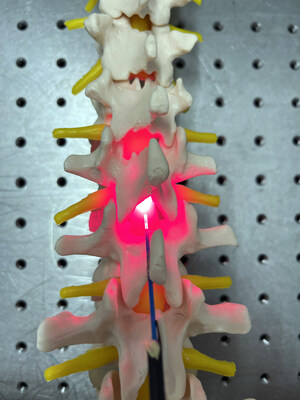BIRMINGHAM, England, Jan. 5, 2021 /PRNewswire/ -- University of Birmingham researchers have invented a COVID-19 test that reduces testing time from 30 minutes to under five, and delivers accurate results.
The method is described in a preprint paper (yet to be peer-reviewed) published on MedRxiv, where the researchers also demonstrate the rapidity and sensitivity of their method using patient sample RNA provided by Public Health England.
Professor Tim Dafforn from the University's School of Biosciences commented: "We have designed a new method for testing that combines the ease of use and speed of lateral flow testing with the inherent sensitivity of an RNA test. It features reagents that can be used in existing point of care devices and meets the need for testing in high throughput, near-patient, settings where people may be waiting in line for their results."
The current gold standard is the Reverse Transcription Polymerase Chain Reaction (RT-PCR) test. This takes more than an hour per sample, and has two steps. The first, which takes 30 minutes, uses a reverse transcriptase enzyme to convert RNA to DNA. The second uses a DNA polymerase enzyme to copy the DNA and amplify it to detectable levels, and requires time-consuming cycles of heating and cooling. Although single temperature processes have been developed this year, reducing this step below 20 minutes has proved challenging. Lateral flow tests, which measure the presence of antibodies, can take up to 30 minutes.
The researchers created a novel single-step approach for converting viral RNA into DNA, and combined it with a known technique called Exponential Amplification Reaction (EXPAR), which increases DNA concentration to detectable levels at a constant temperature. They are calling the new method Reverse Transcriptase Free EXPAR (RTF-EXPAR) testing.
University of Birmingham Enterprise has filed a patent application covering the method and its use in diagnostic equipment, and is now seeking to license the patent for rapid product development.
The method uses a DNA sequence (called Binder DNA) that recognises and binds to SARS-CoV-2 viral RNA and an enzyme (BstNI) that recognises the Binder DNA, and cuts a short section from it when viral RNA is present. Once this cleavage has occurred, the viral RNA is free to bind to more Binder DNA and the cycle is repeated. The test detects the output of this cycle.
The researchers tested the method by introducing BstNI, Binder DNA, and SARS-CoV-2 samples to EXPAR reagents and incubating at a constant temperature of 50oC. These conditions yielded test results in 4.00 +/- 0.72 minutes for the positive sample. No signal was observed for the negative (control) sample after 10 minutes of incubation. The concentration of SARS-CoV-2 RNA in the positive sample was 72.7 copies/µL, a value up to ten times lower than the average viral load found in COVID-19 patient samples.
The method was developed to reduce time and increase throughput in COVID-19 testing. However the technique could be applied to any RNA-based infectious agent or disease biomarker (including cancer), so in the long-term, the use of RTF-EXPAR is expected to extend beyond SARS-CoV-2.
Carter et al (2020). Sub-5-minute Detection of SARS-CoV-2 RNA using a Reverse Transcriptase-Free Exponential Amplification Reaction, RTF-EXPAR is published at: https://www.medrxiv.org/content/10.1101/2020.12.31.20248236v1.
For media enquiries contact:
Ruth Ashton
Email: [email protected]
For commercial enquiries contact:
Dr Veemal Bhowruth
Email: [email protected]
Notes to editor:
The research was funded by a BBSRC doctoral training scheme, the Midlands Integrative Biosciences Training Partnership (MIBTP). The team is currently applying for funding from UK Research and Innovation to develop the test for NHS laboratories.
About University of Birmingham Enterprise
The University of Birmingham is ranked amongst the world's top 100 institutions. Its work brings people from across the world to Birmingham, including researchers, teachers and more than 6,500 international students from over 150 countries.
University of Birmingham Enterprise helps students and researchers turn their ideas into new services, products and enterprises that meet real-world needs. We also support innovators and entrepreneurs with mentoring, advice, and training and manage the University's Academic Consultancy Service.
Logo - https://mma.prnewswire.com/media/1394380/University_of_Birmingham_Enterprise_Logo.jpg
SOURCE University of Birmingham Enterprise

Related Links
WANT YOUR COMPANY'S NEWS FEATURED ON PRNEWSWIRE.COM?
Newsrooms &
Influencers
Digital Media
Outlets
Journalists
Opted In





Share this article